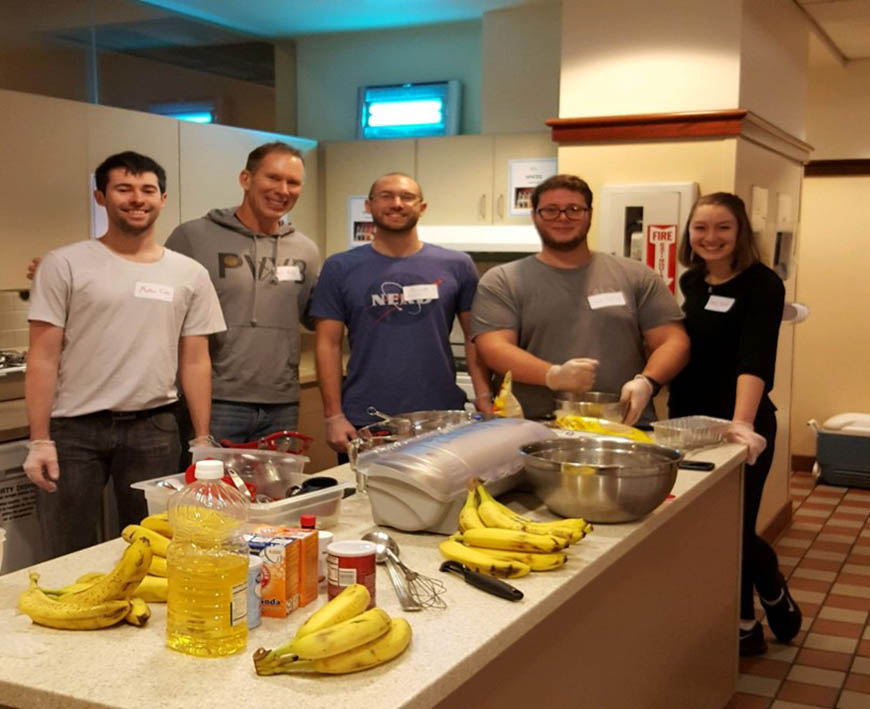NovaCell Graduate Students Lead Community Outreach Initiative

Villanova’s Center for Cellular Engineering (NovaCell) recently launched a new initiative, appropriately titled HEART. Operating from the belief that scientific research be ethical, empathetic and beneficial to communities and society in general, the HEART initiative aims to connect with the local community on a personal level. Recently, three Villanova graduate students participated in HEART’s first outreach event at the Ronald McDonald House in Philadelphia. PhD student Brian Austin-Carter and Biochemical Engineering master’s degree candidates Canaan Coppola and Emily Harris spoke about the HEART initiative.
Q: How is the HEART initiative related to the work of NovaCell?
A: Most of the projects being worked on within NovaCell have some sort of connection to cancer therapy, which is a significant part of the Ronald McDonald House’s mission—to assist families who have a child undergoing cancer treatment or treatment for other diseases and disorders. While our work generally pertains to engineering and optimizing parts of the cancer therapy process, being able to provide direct support to patients and their families was both humbling and rewarding.
Q: What did you do at the RMH? How many Villanovans participated?
We went to the Ronald McDonald House and did the Breakfast Buddies program, which involved bringing groceries to the House and preparing an assortment of breads and breakfast snacks for the families to grab on their way to the hospital. Additionally, as it was right after Christmas when we went, we helped to sort toy donations into categories so they could be distributed to the children. NovaCell Director Dr. Bill Kelly and four graduate students attended.
Q: How has outreach to the Philadelphia Ronald McDonald House affected your connection with NovaCell?
Brian: I would be willing to participate in future NovaCell events due to the positive experience I had at the Ronald McDonald House.
Canaan: The NovaCell Heart program reminds me that the work we do as NovaCell is part of solving a problem that devastates real families. It helps me think about the research we do as more than just scientific problems; they are societal problems, and as engineers we have a responsibility to serve society ethically.
Emily: I think that volunteering with the Ronald McDonald House helped to give more of a purpose to the group and an understanding of how our group can impact those outside of it. Doing our work within the lab every day is something I’m very passionate about, but it is sometimes easy to fall into the pattern of work and not remember the bigger picture that we are a part of. Being somewhere as inspirational as the Ronald McDonald House really brings everything full circle and it’s hard to not be excited about your work when you’re spending time in a place that helps people be able to experience the miracles of science and medicine every day.
Q: What else does the HEART initiative have planned?
A: The HEART initiative is ongoing and we are working on planning some different
events such as a return visit to the Ronald McDonald House in the next few months to do a Guest Chef Dinner, as well as a 5K for cancer on campus. In addition, we are hoping to be able to work with the Andrew McDonough B+ Foundation on campus as their mission (fighting childhood cancer) aligns with ours and we would love to be able to contribute to the wonderful work they do.
Q: How often will HEART members volunteer?
A: Currently, we are hoping to have 3-4 events throughout the academic year for our group members to attend, but we hope to pursue more frequent events as the group grows and establishes more relationships with organizations.
Q: What do you hope to gain through these experiences?
Brian: I hope to gain a connection with the community and provide meaningful impact on peoples’ lives, no matter how small.
Canaan: The research we do in NovaCell is theoretical and has the potential to impact cancer patients on a large scale, but I would also like to help those directly affected on the smaller, more personal level.
Emily: I hope to be able to connect my love for science and engineering in cancer therapy with outreach to those being affected by cancer to remind me how important our work is, and be driven to innovate, as almost everyone knows someone, or is personally affected by the disease.
